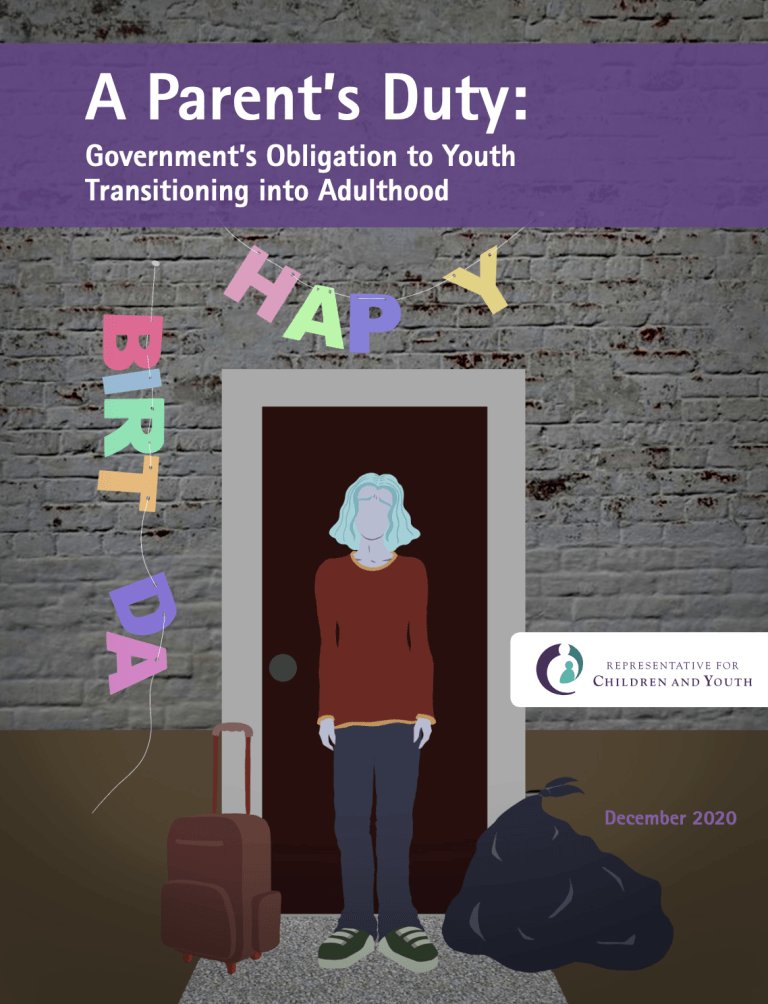4 search results
for
Experiences of mental health issues
Consider an extension of voluntary residential care
Recommendation 4: MCFD should evaluate the current emergency measures in place due to COVID-19 that allow young people to continue to stay in their foster home or staffed residential placements past their 19th birthday. Our Office anticipates that such an evaluation would reveal benefits and feasibility on an ongoing basis. If that is the case, the ministry should implement changes that would allow for continuing foster home or staffed residential care on a voluntary basis, with the length of extension based on the young person’s readiness to transition out of care. Priority consideration should be given to youth and young adults who have disabilities and other physical and mental health needs who are not ready for independence at 19, and not eligible for Community Living BC services.MCFD is to complete the evaluation by December 31, 2021 and develop and implement an approved plan of next steps by April 1, 2022.
-
Category and theme:
Audience:
Groups affected:
Location of recommendation:
Provide additional dedicated housing for youth aging out of care
Recommendation 5: There is perhaps no greater challenge currently facing young people in B.C. transitioning into adulthood than finding appropriate, affordable and safe housing. We echo the recommendation made in the late Katherine McParland’s report, From Marginalized to Magnified: Youth Homelessness Solutions from those with Lived Expertise – that the Ministry of Attorney General and Minister responsible for Housing should work with BC Housing to develop and implement an aggressive plan to work toward ending youth homelessness in B.C., with particular attention to young adults who have transitioned from care. As part of this plan, additional dedicated housing units should be provided for young people aging out of care. Units on a continuum of support – including with mental health and addictions supports where needed – should be available and eligibility requirements reduced.BC Housing is to develop a comprehensive plan by April 1, 2022 and begin full implementation of that plan thereafter.
-
Category and theme:
Audience:
Groups affected:
Location of recommendation:
Provide an enhanced range of trauma-informed and culturally appropriate mental health and substance use services for young people transitioning from care into adulthood
Recommendation 6: The Ministry of Mental Health and Addictions, in partnership with the Ministry of Health and MCFD, should develop and implement a plan for mental health and substance use services for youth in care who are transitioning to adulthood. The plan should be developed in consultation with appropriate First Nations, Métis, Inuit and Urban Indigenous representatives as well as young people with lived experience.This plan should be integrated into A Pathway to Hope. It should specifically address the needs of the population of young people leaving care and the specialized services they need due to the inequities, adversities and trauma they have experienced in their lives before and while in care. The plan and all services should be trauma-informed and give particular attention and priority to First Nations, Métis, Inuit and Urban Indigenous young people transitioning to adulthood.
The plan is to be developed by April 1, 2022, with full implementation being completed within the ensuing two years.
-
Category and theme:
- Ableism ,
- Ageism ,
- Culture and language ,
- Decolonization and Indigenous rights ,
- Discrimination and hate ,
- Economic inequality ,
- Health ,
- Health, wellness and services ,
- Income insecurity and benefits ,
- Indigenous children and youth in care ,
- Indigenous rights and self-governance ,
- Poverty ,
- Poverty and economic inequality ,
- Public services ,
- Representation and leadership ,
- Substance use
Audience:
Groups affected:
Location of recommendation:
Collect longitudinal data and evaluate services
Recommendation 7: In order to ensure high quality and equitable services, there must be ongoing data collection and evaluation. MCFD should engage the Ministry of Citizen Services and relevant ministries and public bodies to develop and implement a plan that enables:- Longitudinal data collection about young people who have aged out of care in British Columbia.
- Evaluation of post-majority services and supports and the public sharing of the evaluation results.
- Standardized data across the province that is reported regularly, including (but not limited to) the following disaggregated data: identity factors such as ethnicity and gender identity as well as indigeneity – First Nations, Métis and Inuit identity.
A cross-ministry plan is to be developed by April 1, 2022 with full implementation of that plan to begin thereafter.
-
Category and theme:
Audience:
Groups affected:
Location of recommendation:
